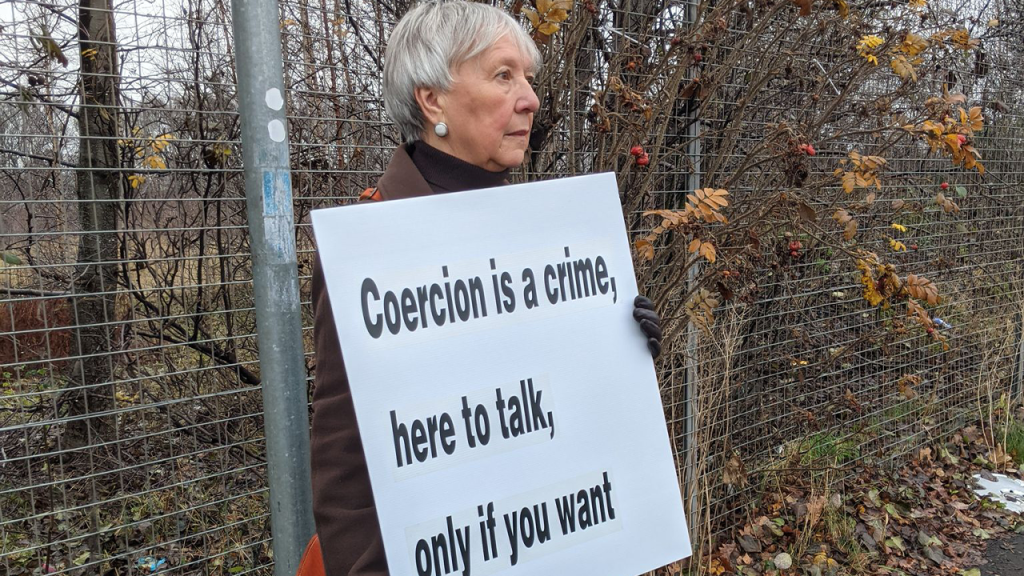In a significant development regarding free speech and abortion rights in the UK, a 74-year-old grandmother, Rose Docherty, was arrested outside an abortion clinic in Glasgow for holding a sign reading, “Coercion is a crime, here to talk if you want.” This incident, which occurred in February, marks a pivotal moment as it represents the first arrest under the new Safe Access Zones law, implemented to restrict protests around abortion facilities. Lawmakers are now contemplating an expansion of the buffer zones, which may impact the rights of individuals wishing to express their views at such locations.
| Article Subheadings |
|---|
| 1) Background of the Safe Access Zones Act |
| 2) The Arrest of Rose Docherty |
| 3) Legal and Political Reactions |
| 4) Implications for Free Speech |
| 5) Global Context and Further Developments |
Background of the Safe Access Zones Act
The Safe Access Zones Act was introduced as a reaction to increased protests outside abortion clinics across Scotland. Prior to its implementation in September, many clinics reported persistent demonstrations that were often confrontational, making it difficult for patients to access services without emotional distress. Established under the premise of protecting individuals seeking medical care, the legislation creates a buffer zone extending 200 meters (656 feet) from designated clinics. Notably, the law also permits the Scottish government to extend this zone if deemed necessary, leading to ongoing debates about its implications for free speech and public expression.
The Arrest of Rose Docherty
On February 16, 2023, Rose Docherty was arrested in close proximity to the Queen Elizabeth University Hospital (QEUH) in Glasgow for holding a sign that communicated her willingness to engage in conversation. The act was described as an attempt to offer support to those contemplating abortion. Following her arrest, Docherty expressed her belief that she had adhered to the law, as she did not consider her actions to be a form of protest but rather an effort to listen and provide information. In her first interview after the incident, she remarked on the surreal nature of her experience, standing by her actions and refusing to accept a formal warning from the Crown Office.
Legal and Political Reactions
The arrest has generated a significant political and legal discourse around the interpretation of the Safe Access Zones Act. Gillian Mackay, the Green Party parliamentarian who brought forth the legislation, has publicly supported the existing laws and has suggested the Scottish government consider expanding the zones. In contrast, civil liberties advocates have raised concerns about the implications of such expansions on the rights of individuals to freely express their opinions and beliefs. As the discussion unfolds, both sides are adamant in their positions, with advocates for the law arguing the necessity of these zones to protect vulnerable individuals, while opponents voice potential overreach.
Implications for Free Speech
The ramifications of Docherty’s arrest extend beyond her individual case, sparking a broader conversation about the state of free speech in the UK. Critics argue that the legislation is a thinly veiled attempt to stifle dissenting opinions regarding abortion.
“It wouldn’t matter where we stood—201 meters or 500 meters away,”
Docherty stated, expressing her belief that the government’s intent was to eliminate opposition to abortion universally. This incident intertwines with a growing narrative regarding how free speech rights are being curtailed in various contexts, igniting response from advocacy groups, media, and legal experts who are closely monitoring implications for civil liberties.
Global Context and Further Developments
The situation in the UK is part of a broader global trend observed in other democracies. For instance, in Australia, concerns have been raised regarding similar legislative initiatives perceived as attacks on freedoms. Furthermore, the arrests of other pro-life activists like Isabel Vaughan-Spruce, who faced similar charges for silently praying outside abortion clinics, highlight a troubling pattern regarding the rights to free expression around sensitive issues. Analysts suggest that these developments may inspire further legal challenges and public discourse on the boundaries of free speech in the context of healthcare and moral stance in various parts of the world.
| No. | Key Points |
|---|---|
| 1 | The Safe Access Zones Act was introduced to mitigate protests near abortion clinics. |
| 2 | Rose Docherty’s arrest is the first under the new legislation, leading to debates on free speech. |
| 3 | Gillian Mackay proposes expanding buffer zones in response to reports of distress among patients. |
| 4 | The incident raises significant concerns about potential infringements on free speech rights. |
| 5 | The global context shows a rising trend of legislation affecting free speech on sensitive issues. |
Summary
The arrest of Rose Docherty highlights an escalating conflict between protecting individuals seeking abortion services and safeguarding free speech rights. As lawmakers consider extending buffer zones under the Safe Access Zones Act, the implications for public discourse on sensitive subjects are profound. This ongoing discussion not only impacts legislation in the UK but also resonates with broader international patterns regarding freedom of expression, reflecting the challenges democratic societies face in balancing individual rights against collective health and safety.
Frequently Asked Questions
Question: What is the Safe Access Zones Act?
The Safe Access Zones Act is legislation in Scotland prohibiting protests or vigils within 200 meters of abortion clinics, designed to protect individuals seeking services from distress caused by confrontational demonstrations.
Question: What are the implications of extending the buffer zones?
Expanding buffer zones could lead to further restrictions on free speech, as individuals may be prohibited from expressing opinions or engaging in discussions near designated areas, raising concerns among civil liberties advocates.
Question: How has public reaction been toward Docherty’s arrest?
Public reaction has been mixed, with some supporting the need for buffer zones to protect patients, while others see Docherty’s arrest as an alarming infringement on free speech rights, leading to broader discussions on this issue.
